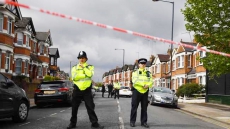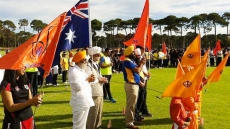In a government-approved history textbook in Pakistan, Hindus are described as “thugs” who “massacred Muslims, confiscated their property, and forced them to leave India”.
Pakistani high school student Noman Afzal knows “traitorous” Hindus are to blame for the bloodshed that erupted when British India split into two nations 70 years ago. His history textbook tells him so.
Students across the border in India are taught a starkly different version of events, the result of a decades-long effort by the nuclear-armed rivals to shape and control history to their own nationalistic narrative.
The official unwillingness to confront the bitter legacy of Partition -- and the skewed portrayals being peddled in classrooms from New Delhi to Karachi -- is hindering any hope of reconciliation between the arch-rivals, experts say.
August marks 70 years since the subcontinent was divided into two independent states -- Hindu-majority India and Muslim-majority Pakistan -- and millions were uprooted in one of the largest mass migrations in history.
An untold number of people -- some estimates say up two million -- died in the savage violence that followed, as Hindus and Muslims fleeing for their new homelands turned on one another, raping and butchering in genocidal retribution.
The carnage sowed the seeds for the acrimony that prevails today between India and Pakistan, and generations later this defining moment in the subcontinent’s history is still polarised by nationalism and rancour.

In a government-approved grade five history textbook used in schools in Pakistan’s Baluchistan province, Hindus are described as “thugs” who “massacred Muslims, confiscated their property, and forced them to leave India”.
“They looked down upon us, that is why we created Pakistan,” said 17-year-old Afzal from Pakistan’s Punjab province, reeling off a stock answer from his history textbook.
On the other side of the border, Mumbai schoolboy Triaksh Mitra learned how Mahatma Gandhi fought for a unified India free from British subjugation while the Muslim League -- the political party led by Pakistan’s founder Muhammad Ali Jinnah -- sided with the colonial rulers to carve out their own nation.
“But what they hadn’t really told us was the Muslim side of it,” the 15-year-old said of his Partition studies.
The chapters on Gandhi are a striking example of the gap between how Partition is portrayed on either side of the border. In Pakistan, his contribution to the struggle for independence is hardly mentioned, whereas in India he is hailed as an “one-man army”.
History teacher Aashish Dhakaan, who works in a high school in India’s Gujarat, acknowledged that the creation of the Muslim League was popularly upheld as “self reliance and liberty” in Pakistan, and the folly of “gullible Muslims” in India.
“In our history we won the war, and in their history textbooks, they won the war,” said Dhakaan.
While the government-sanctioned curriculums on both sides of the border appear largely ossified to their version of history, one Pakistan-based group has been using games and popular culture to challenge students to think critically about their past.
Qasim Aslam’s History Project runs sessions in schools in India and Pakistan, inviting students to compare how Partition accounts are presented in the two countries’ textbooks.

“By the time they are 20, it is solidified and stays with them all their lives,” Aslam said of the one-sided history lessons proffered in schools.
Mumbai-based student Mitra attended one of these sessions in April.
“It helped me to take a different viewpoint into account and to form a more balanced notion,” Mitra said.
“If I know only one part, then it’s not the complete truth.”
Islamabad-based Pakistan studies professor Tariq Rehman said that correcting bias in the official syllabi “would take a change in foreign policy” between the two countries.
“Authorities (in Pakistan) don’t seem to be interested in making changes and question the antagonism against India,” he added.

But there are small signs of progress. The latest revision of the state history textbook in India includes graphic first-hand accounts of atrocities committed by Hindus, and asks students if the violence could be considered a holocaust.
A book of testimonies titled The Other Side of Silence by Indian writer and Partition historian Urvashi Butalia is now also part of the high school syllabus in India.
Butalia said she is pleased that more people are trying to understand Partition beyond a nationalistic prism.
“It would have been impossible 20 years ago,” she said.
But outside the classroom, Butalia says there is little appetite for confronting hard truths about the past.
The author discovered a series of police reports of rapes and murders from 1947 that had been kept hidden because authorities feared “opening up a can of worms” if the horrifying accounts went public.
She also points to Humayan’s Tomb and Purana Qila -- two ancient monuments in New Delhi -- where thousands of Partition refugees sought sanctuary as the capital descended into chaos, noting there is no plaque at either site to remind the public of this troubled legacy.

“I do not say that silence is broken,” she added. “We could learn so much, basically learn never to repeat that history, but we don’t memorialise it in any way,” she warned.




